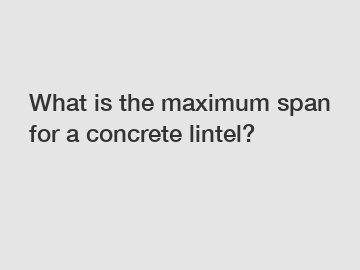Mar. 12, 2024
Machinery
As a homeowner, builder, or architect, one of the key considerations when designing or renovating a building is the type and size of lintels to be used. A lintel is a horizontal beam typically made of concrete, steel, or wood that spans an opening in a wall to support the weight above it. In this blog post, we will focus on concrete lintels and answer the question: What is the maximum span for a concrete lintel?
Before we dive into the specifics of concrete lintels, it's important to understand the purpose they serve in a building structure. Lintels are essential components that help distribute the weight of the building evenly, preventing the walls or openings from cracking or collapsing under the weight they support. They play a critical role in maintaining the structural integrity of a building, especially in load-bearing walls or openings such as doors and windows.
When it comes to concrete lintels, there are a few factors to consider when determining the maximum span they can effectively support. The key factors include the type of concrete used, the design of the lintel, the load it will bear, and the dimensions of the opening it spans. Let's explore each of these factors in more detail.

First and foremost, the type of concrete used in the lintel will have a significant impact on its load-bearing capacity. There are various types of concrete available, with different strengths and compositions. For example, high-strength concrete can support heavier loads and span longer distances compared to regular concrete. It's essential to consult with a structural engineer or building professional to determine the appropriate type of concrete for your specific project.
Next, the design of the lintel plays a crucial role in determining its maximum span. The design includes factors such as the shape, size, and reinforcement of the lintel. A well-designed lintel will distribute the weight evenly across the opening it spans, reducing the risk of failure or collapse. To ensure the lintel meets the required specifications, it's advisable to work with a qualified architect or engineer who can create a design that meets the building's structural needs.
The load that the lintel will bear is another critical factor to consider when determining the maximum span. The load includes not only the weight of the building materials above the opening but also any additional loads such as snow, wind, or seismic forces. The lintel must be able to support these combined loads without bending or breaking. It's essential to calculate the total load accurately to ensure the lintel is designed to handle the required capacity.
Finally, the dimensions of the opening that the lintel spans will also impact its maximum span. The wider the opening, the longer the lintel must be to support the weight above it. The lintel must be designed to cover the entire width of the opening and distribute the load evenly across its length. Factors such as the depth and thickness of the lintel will also influence its load-bearing capacity and maximum span.
In conclusion, the maximum span for a concrete lintel will vary depending on several factors, including the type of concrete used, the design of the lintel, the load it will bear, and the dimensions of the opening it spans. It's crucial to work with qualified professionals such as architects, engineers, or builders to ensure the lintel is designed and installed correctly to meet the building's structural requirements. By taking these factors into consideration, you can ensure the safety and stability of your building for years to come.
If you are interested in sending in a Guest Blogger Submission,welcome to write for us!
All Comments ( 0 )